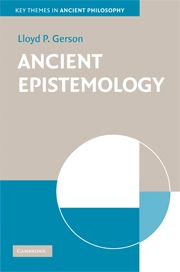Book contents
8 - Varieties of naturalism
Published online by Cambridge University Press: 05 June 2012
Summary
NATURALISM REDIVIVUS
I have argued that the ancient philosophers generally treated knowledge and belief naturalistically. The non-naturalistic or criteriological approach of the Standard Analysis is aborted in Plato's Theaetetus, although the Standard Analysis itself lives on in its subsequent application to rational belief. If knowledge is a natural feature of human life like digestion or pregnancy, it would seem to be available for empirical scientific investigation. If that is so, ancient epistemological naturalism will find itself at a disadvantage, to put it mildly. For to admit the relevance of biology, neurophysiology, psychology and so on to the study of epistemology seems to ensure that ancient naturalism is doomed to melt into the deep background of historical curiosities. In this light, if one rejects a contemporary version of naturalised epistemology, the only plausible alternative would seem to be some non-naturalised approach, most appropriately rooted in logical or linguistic analysis and in the evaluative use of a certain class of terms and concepts. An analysis of how our words or concepts are used or even how they ought to be used need not have anything to fear from the deliverances of modern empirical science. By contrast, insofar as ancient epistemology is supposed to be dependent on ancient science, its subsequent obsolescence appears to be inevitable. I have in the preceding chapters tried to cast some doubt both on the supposition that ancient epistemological naturalism is susceptible to refutation by the claims of empirical science and on the perhaps more egregious error of supposing that ancient epistemology is not a form of naturalism.
- Type
- Chapter
- Information
- Ancient Epistemology , pp. 152 - 165Publisher: Cambridge University PressPrint publication year: 2009



